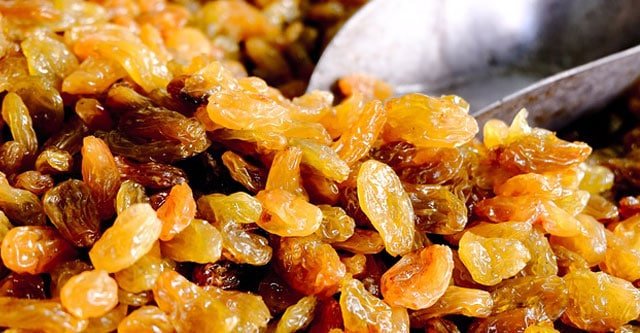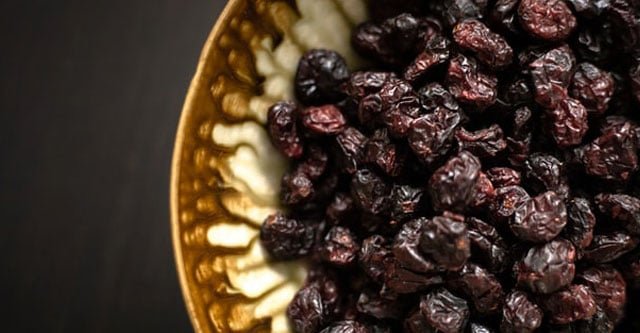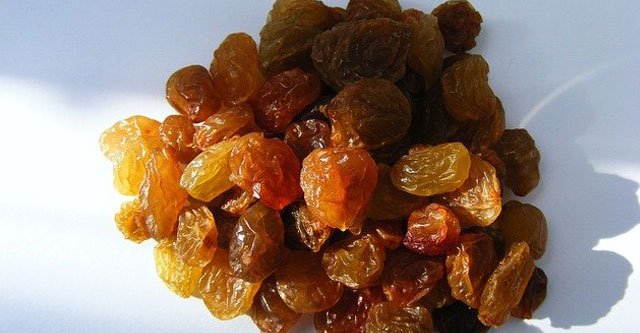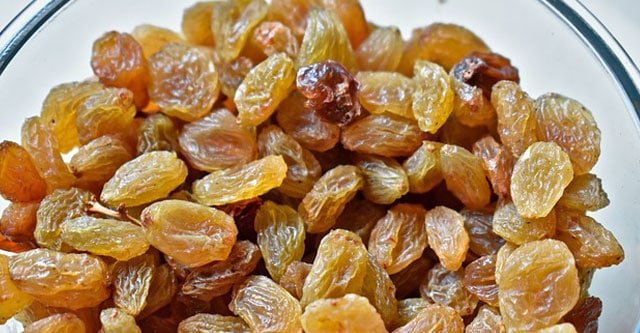Last Updated on January 6, 2021 by Dr Sharon Baisil MD
Raisins are rich in sugar, fiber, vitamins, and minerals. However, raisins have a moderate glycemic index and can create sudden spikes in blood glucose levels. So, a person with diabetes should eat raisins only in moderation.
What are the effects of eating raisins is Diabetes?

There are mixed opinions regarding this fact.
Usually, the high sugar content of food adversely affects the blood sugar of a diabetic patient. Raisin is dried fruit. All the nutrients, including sugars, are very much concentrated here. Here, fructose is 30%, and glucose is 28% of the overall nutrients.
These are simple sugars and can easily elevate the blood sugar level. This is an avoiding criterion of a raisin in diabetes.
Also, the size of a grape is larger than a raisin. A cup of grapes contains 27 grams of carbohydrates, whereas a raisin cup has 115 grams of carbohydrates.
So there is a vast source of energy contained in a small handful of raisins. This small amount basically can not meet up with your cravings, and you tend to eat more. This paves the way towards poor blood sugar control.
Raisins have a moderate glycemic index of 64. It determines blood glucose spike after a carbohydrate meal—the lower the value, the lower the glucose spike.
Raisin contains a lot of fiber. This fiber content is responsible for the long time satiation.
Eating a moderate amount of raisin will drive away your hunger. This moderate consumption is key to weight loss and controlling weight is necessary for diabetics.
Diabetic people have a common tendency to become hypoglycemic. It is a complication of regular insulin therapy.
As raisins are an immediate energy booster, a handful of them can be the best option to overcome this. An acute attack of hypoglycemia needs about 15 grams of carbohydrates(2 tablespoons of raisins).
The antioxidants, minerals, and vitamins of raisins can halt any inflammation process and make the immune system healthy. People with diabetes usually are immunosuppressed. Good raisin can improve the condition.
Eating raisins in the right amount and the right way can give benefits to diabetic patients.
What are the Nutrition facts of Raisins?

Serving size: 100 grams
Calorie: 299 Kcal
| Black Raisins – Nutrition Information | ||
| Types of nutrients | Nutrient value(in gram) | % daily value |
| Carbohydrates ● Sugar ● Fiber | 79.18 59.19 3.7 | 26%
14% |
| Fat | 0.46 | 0% |
| Protein | 3.07 | 6% |
| Vitamins | Nutrient value | % daily value |
| Pyridoxine | 0.174mg | 13% |
| Riboflavin | 0.125mg | 10% |
| Thiamine | 0.106mg | 9% |
| Niacin | 0.766mg | 5% |
| Vitamin K | 3.5 microgram | 3% |
| Vitamin C | 2.3mg | 3% |
| Pantothenic acid | 0.095mg | 2% |
| Choline | 11.1mg | 2% |
| Folate | 5 microgram | 1% |
| Vitamin E | 0.12mg | 1% |
| Minerals | Nutrient value | %daily value |
| Potassium | 749 mg | 16% |
| Phosphorus | 101 mg | 14% |
| Manganese | 0.299 mg | 14% |
| Iron | 1.88 mg | 14% |
| Magnesium | 32 mg | 9% |
| Calcium | 50 mg | 5% |
| Sodium | 11 mg | 1% |
It also has some zinc and fluoride contents. All these make it worth eating in diabetes.
| Golden Raisins – Nutrition Information | |||
| Serving size 1 oz (60 raisins) = 28.35 g | |||
| Nutrient | Amount | Unit | DV |
| Calories | 84.77 | KCAL | |
| Fat | 0.07 | G | 0% |
| Protein | 0.94 | G | 2% |
| Carbohydrate | 22.49 | G | 8% |
| Folic acid | 0 | UG | |
| Vitamin D (D2 + D3), International Units | 0 | IU | |
| Alcohol, ethyl | 0 | G | |
| Choline | 3.1 | MG | |
| Fluoride, F | 66.3 | UG | |
| Retinol | 0 | UG | |
| Cholesterol | 0 | MG | 0% |
| Fatty acids, total trans | 0 | G | |
| Saturated fatty acids | 0.027 | G | 0% |
| Octanoic acid | 0 | G | |
| Dodecanoic acid | 0 | G | |
| Tetradecanoic acid | 0.001 | G | |
| Docosahexaenoic n-3 acid (DHA) | 0 | G | |
| Docosanoic acid | 0.001 | G | |
| Fatty acids, total trans-monoenoic | 0 | G | |
| Hexadecenoic acid | 0 | G | |
| Eicosapentaenoic n-3 acid (EPA) | 0 | G | |
| Docosapentaenoic n-3 acid (DPA) | 0 | G | |
| Heptadecanoic acid | 0 | G | |
| Tetracosanoic acid | 0.001 | G | |
| Trans-hexadecenoic acid | 0 | G | |
| Tetracosenoic cis acid | 0 | G | |
| Cis-octadecenoic acid | 0.006 | G | |
| Cis,cis-octadecadienoic n-6 acid | 0.011 | G | |
| Docosenoic cis acid | 0 | G | |
| Cis,cis,cis-octadecatrienoic n-3 acid (ALA) | 0 | G | |
| Eicosadienoic n-3 acid | 0 | G | |
| Trans-octadecatrienoic acid | 0 | G | |
| Docosatetraenoic acid | 0 | G | |
| Vitamin D3 | 0 | UG | |
| Vitamin D | 0 | UG | 0% |
| Fiber | 1.3 | G | 5% |
| Iron, Fe | 0.51 | MG | 3% |
| Magnesium, Mg | 10.21 | MG | 3% |
| Phosphorus, P | 27.78 | MG | 4% |
| Sodium, Na | 7.37 | MG | 0% |
| Copper, Cu | 0.077 | MG | 9% |
| Manganese, Mn | 0.08 | MG | 3% |
| Ash | 0.48 | G | |
| Fructose | 9.83 | G | |
| Butanoic acid | 0.002 | G | |
| Hexanoic acid | 0 | G | |
| Docosenoic acid | 0 | G | |
| Monounsaturated fatty acids | 0.007 | G | |
| Polyunsaturated fatty acids | 0.015 | G | |
| Pentadecanoic acid | 0.001 | G | |
| Trans-octadecenoic acid | 0 | G | |
| Docosenoic trans acid | 0 | G | |
| Trans-octadecadienoic acid | 0 | G | |
| Octadecadienoic CLAs acid | 0 | G | |
| Fatty acids, total trans-polyenoic | 0 | G | |
| Eicosadienoic n-6 acid | 0 | G | |
| Hexadecanoic acid | 0.016 | G | |
| Octadecanoic acid | 0.004 | G | |
| Eicosanoic acid | 0.001 | G | |
| Octadecenoic acid | 0.007 | G | |
| Octadecadienoic acid | 0.011 | G | |
| Octadecatrienoic acid | 0.004 | G | |
| Octadecatetraenoic acid | 0 | G | |
| Cis-hexadecenoic acid | 0 | G | |
| Cis,cis,cis-octadecatrienoic n-6 acid | 0 | G | |
| Potassium, K | 210.92 | MG | 4% |
| Zinc, Zn | 0.1 | MG | 1% |
| Sucrose | 0 | G | |
| Glucose (dextrose) | 8.65 | G | |
| Water | 4.38 | G | |
| Sugars | 18.48 | G | |
| Calcium, Ca | 17.58 | MG | 1% |
| Vitamin B12 | 0 | UG | 0% |
| Folate, food | 1.42 | UG | |
| Folate, DFE | 1.42 | UG | 0% |
| Vitamin E added | 0 | MG | |
| Vitamin B12 added | 0 | UG | |
| Tetradecenoic acid | 0 | G | |
| Heptadecenoic acid | 0 | G | |
| Pentadecenoic acid | 0 | G | |
| Lactose | 0 | G | |
| Vitamin A | 0 | IU | 0% |
| Vitamin K | 1 | UG | 1% |
| Vitamin A, RAE | 0 | UG | |
| Carotene, beta | 0 | UG | |
| Carotene, alpha | 0 | UG | |
| Cryptoxanthin, beta | 0 | UG | |
| Lycopene | 0 | UG | |
| Vitamin C | 0.7 | MG | 1% |
| Thiamin | 0.03 | MG | 2% |
| Riboflavin | 0.035 | MG | 3% |
| Folate | 1.42 | UG | |
| Caffeine | 0 | MG | |
| Theobromine | 0 | MG | |
| Maltose | 0 | G | |
| Selenium, Se | 0.2 | UG | 0% |
| Vitamin E | 0.03 | MG | 0% |
| Decanoic acid | 0 | G | |
| Lutein + zeaxanthin | 0 | UG | |
| Niacin | 0.217 | MG | 1% |
| Vitamin B6 | 0.049 | MG | 4% |
| Cis,cis-eicosadienoic n-6 acid | 0 | G | |
| Eicosadienoic acid | 0 | G | |
| Eicosenoic acid | 0 | G | |
| Eicosatetraenoic acid | 0 | G | |
| Tocopherol, alpha | 0.03 | MG | |
What is the Glycemic index of raisins?

The Glycemic index is a glucose spike marker in the blood immediately after eating something that contains carbohydrates compared with glucose or white bread.
This value helps to choose healthy foods. A diabetic person must care about the quality and quantity of carbohydrates he or she consumes.
The Glycemic index is the qualitative indicator here. I have already mentioned the glycemic index value of raisin. It is 64, which belongs to the medium glycemic category.
The more complex the carbohydrate, the lower the glycemic index value. It means that your digestive system needs more time to simplify them. As a result, foods with a lower GI will not spike your blood glucose more.
From this context, the use of raisin should be moderated.
Another thing you must have to keep in mind. The amount of carbohydrate in one serving should be precisely maintained. Thus you can get optimum benefits from eating raisins.
12 Health Benefits of Raisins in Diabetes
- Better digestion process: Due to the soluble fiber content, raisins are considered a good laxative. Regular eating of kishmish or raisin in a moderate amount will give benefits to the patients with constipation.
Also, it acts as a natural antacid in improving bloating and acidity. A healthy bowel is necessary to keep cancers and other complicated diseases at bay.
- Antioxidant properties: Antioxidants in a regular diet can render a variety of benefits.
Different polyphenolic phytochemicals like resveratrol and anthocyanin can act as anti-inflammatory, anti-cancerous, anti-allergic, antitoxin compounds.
The ORAC (Oxygen radical absorbance capacity) value of raisin is 3,400. It means that it has more bioavailability.
These compounds remove toxic cells from the body and cease the infection and inflammation procedures.
They prevent oxidative damage and wash away the free radicals. Thus they act as immunity boosters.
They prevent blood clots and reduce the risk of stroke. Resveratrol has blood cholesterol-lowering properties as well.
They also have the rejuvenating power of skin and hair.
- Prevention of eye disorder: The polyphenolic antioxidants damage the free radicals in eye infections. In this way, cataracts and age-related macular degeneration are prevented.
- Correction of anemia: Like other dry fruits, raisin has excellent potential to reduce anemia.
The abundant vitamins, minerals like iron and copper in the raisin can promote red blood cells and hemoglobin production. This, in turn, increases oxygen transportation throughout the body.
- Reduction of heart disease incidence: Low sodium and high potassium content of raisin help relax blood vessels and prevent salt and water retention.
As a result, blood pressure is reduced, and the incidence of heart disease is also reduced.
- Improves the teeth’ health: Eating raisins keeps the teeth clean and prevents the germs from accumulating in the cavities.
Oleanolic acid present in raisins prevents tooth decay. The calcium content of raisin preserves the peels of teeth. Also, the boron content has a teeth whitening property.
- Improves brain function: Members of the vitamin B complex family are responsible for improved brain function. Raisin has almost 30% of the daily recommended value of vitamin B complex. These help in mood stabilization. Also, it has a good effect on sleep.
- Keeps the bone healthy: Calcium helps make the bone strong, and boron aids in new bone formation.
- Solve the problems of bad breath: The antibacterial properties of raisin keep the bad breath at bay. Thus raisin maintains oral hygiene.
What are the side effects of Raisins in Diabetes?
Despite numerous benefits, eating this sweet, dry fruit may raise some health issues:
- Some people are prone to allergies to raisins. This may cause wheezing and other breathing difficulties.
- Due to the smaller size, it is tough to control the portion size. This, in turn, leads to high-calorie intake. One may lose control of overweight.
- Eating excess amounts also leads to the intake of extra soluble fibers. This ultimately causes cramps, flatulence, and even diarrhea.
- Sometimes, children and psychologically disoriented patients have choked with raisin accidentally. The small size is responsible for that.
So, eat in moderation and in a careful way.
What are the latest Research findings of eating raisins in Diabetics?
★A study of Postgraduate Medicine reveals that regular eating of raisin may reduce the risk factors (e.g., High Blood pressure)of cardiovascular diseases compared to other snacks.
★Another study of Postgraduate Medicine says that it may reduce blood sugar levels compared with other sugary snacks. This is proved by the estimation of the HbA1C level in the blood. It is a marker of blood glucose control over 3-4 months.
★A study posted in the Journal of nutritional health noted that raisins are rich in antioxidants and phenol compounds compared with other well known dry fruits.
★In 2011, a health study suggested that raisins serve just like sports jelly beans, consumed in athletes doing endurance exercise. The high sugar content is the source of instant energy.
★A study performed in 2009 noted the presence of a high amount of phytochemicals. These make healthy teeth and gum.
How many raisins can you eat in a day if you have diabetes?
Always try to eat one serving at a time. According to the Centers For Disease Control And Prevention, a carb serving should not be more than 15 grams.
One standard serving of raisin is about 15 grams, which is equivalent to 2 tablespoons of raisins.
Smart ways of eating raisins in Diabetes
Raisins are regarded as “Nature’s Candy” for their sweet taste. It can be an excellent alternative to processed sugar and sweet cravings.
First, you have to buy the raisins, which are devoid of added sugars. Then you should maintain the standard serving size of raisins at a time.
Raisins, soaked in water, give more benefits. The nutrients become more available to the body after washing them.
- It may be eaten raw, mixing with other dry fruits like almonds and dates.
- It may be added to oatmeal, granola, or other cereals.
- It may be used as a topping in different types of salads. (chicken salad, coleslaw, green salad, etc.)
- Replace granulated sugar with raisins in making banana bread, pumpkin bread or cookies, etc.
- It may be added to yogurt.
- You can also add this to pasta.
Takeaway message
Raisin is an essential member of the dry fruits family. The nutrients are more dense and jam-packed in the raisins than the fresh grapes.
Raisins are highly available everywhere. You need to be cautious while buying them, as there are many varieties with added sugar.
The authentic raisins provide sweetness in a dish in a natural way. People with diabetes can quickly eat a dessert or cookies made with raisins instead of refined sugar.
Most of the harmful effects of raisins arise from unwise eating. It means that only a significant amount of raisins have the potential to do those effects.
As the glycemic index is in a low category, raisins can undoubtedly be eaten in diabetes. But you have to take care of the amount that you consume.
References
- https://pubmed.ncbi.nlm.nih.gov/28045444/
- https://pubmed.ncbi.nlm.nih.gov/20386657/
- https://pubmed.ncbi.nlm.nih.gov/28843911/
- https://pubmed.ncbi.nlm.nih.gov/23990623/
- https://pubmed.ncbi.nlm.nih.gov/28874357/
- https://pubmed.ncbi.nlm.nih.gov/31878160/
- https://pubmed.ncbi.nlm.nih.gov/28673757/
- https://pubmed.ncbi.nlm.nih.gov/23789931/
- https://pubmed.ncbi.nlm.nih.gov/29446089/
- https://pubmed.ncbi.nlm.nih.gov/23557933/









